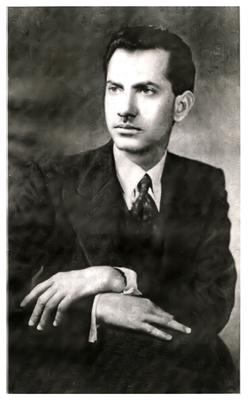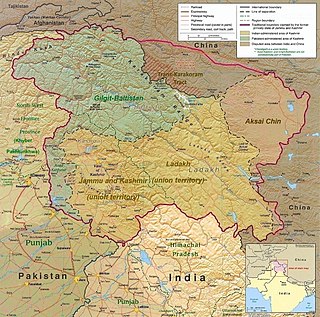Related Research Articles

Azad Jammu and Kashmir, abbreviated as AJK and colloquially referred to as simply Azad Kashmir, is a region administered by Pakistan as a nominally self-governing entity and constituting the western portion of the larger Kashmir region, which has been the subject of a dispute between India and Pakistan since 1947. Azad Kashmir also shares borders with the Pakistani provinces of Punjab and Khyber Pakhtunkhwa to the south and west, respectively. On its eastern side, Azad Kashmir is separated from the Indian union territory of Jammu and Kashmir by the Line of Control (LoC), which serves as the de facto border between the Indian- and Pakistani-controlled parts of Kashmir. Geographically, it covers a total area of 13,297 km2 (5,134 sq mi) and has a total population of 4,045,366 as per the 2017 national census.

Sardar Muhammad Ibrahim Khan was a Kashmiri revolutionary leader and politician, who led the 1947 Poonch Rebellion against absolute rule of the Maharaja in the state of Jammu and Kashmir and played a key role in the First Kashmir War, supporting Pakistan. He served as the President of Azad Kashmir for 13 years across four non-consecutive terms and still remains the longest-serving president of the state, since its establishment.
Sultan Mehmood Chaudhry is an Azad Kashmiri politician who hails from Mirpur. He served as Prime Minister of Azad Kashmir between July 1996 to July 2001 and is currently serving as the President of Azad Kashmir since 25 August 2021.
Abdur Rasheed Turabi is a well-known politician of Azad Jammu & Kashmir. He was the Emir of Jamaat-e-Islami Azad Kashmir till July 2017. Dr Khalid Mahmood is his successor and newly elected Ameer of JI AJK. He is a well known columnist and also has written books giving the guidelines of solution of Kashmir dispute. He remained President of Islami-e-Jamiat Talaba Kashmir Chapter (1974–76). He participated greatly in the freedom movement of Kashmir. He is member of Legislative Assembly of Azad Jammu & Kashmir. He is also member of Muslim World league.

The president of Azad Kashmir, officially the president of the State of Azad Jammu and Kashmir is the constitutional and ceremonial head of state of Azad Kashmir.

Raja Muhammad Farooq Haider Khan is an Azad Kashmiri politician and former Prime Minister of Azad Jammu and Kashmir. He is a senior member of the Pakistan Muslim League (N).

The history of Azad Kashmir, a disputed part of the Kashmir region currently administered by Pakistan, is related to the history of the Kashmir region during the Dogra rule. Azad Kashmir borders the Pakistani provinces of Punjab and Khyber Pakhtunkhwa to the south and west respectively, Gilgit–Baltistan to the north, and the Indian union territory of Jammu and Kashmir to the east. The region is claimed by India and has been the subject of a dispute between India and Pakistan since 1947.

Sardar Muhammad Yaqoob Khan is an Azad Kashmiri businessman and politician. He served as the President of Azad Kashmir from 25 August 2011 to 25 August 2016. He also served as the Prime Minister of Azad Kashmir from 7 January 2009 to 22 October 2009. Beside politics, Khan is also serving as the Chairman of YK Group of Companies.

The Special Communications Organization (SCO) (Urdu: خصوصی مواصلاتی تنظیم) is Pakistani public sector organization operated by MoIT&T. SCO plays a role in providing telecommunication services in Azad Kashmir and Gilgit Baltistan to almost 1.7 million people, a quarter of the total population.

Sahibzada Muhammad Ishaq Zaffar also known as Ishaq Zaffar (1945–2006) was a Pakistani politician in Azad Kashmir administrative territory. He filled various positions in the Azad Kashmir government from the 1970s until dying in office in 2006, beginning as a member of the Pakistan People's Party, serving as member of the Azad Kashmir Legislative Assembly, Speaker of the Assembly, Acting President of Azad Kashmir, and senior minister, and was opposition leader in the constituent assembly at the time of his death. He contested elections for constituent assembly of Azad Kashmir for five times and always won assembly seat.

The Government of Azad Kashmir is the state government which administers one of the territories of Pakistani-administered Kashmir territories of Azad Kashmir. The Azad Kashmir government consists of a president as head of state and a prime minister as chief executive, with the support of a council of ministers. The state assembly is the Azad Kashmir Legislative Assembly.

General elections were held in Azad Kashmir on 21 July 2016 to elect 41 members of the Azad Kashmir Legislative Assembly. Polling started at 8:00am and continued until 5:00pm.

Bank of Azad Jammu & Kashmir is the state-owned bank of Government of Azad Kashmir which is based in Muzaffarabad, Azad Kashmir. It was founded in 2005.
The Supreme Court of Azad Jammu and Kashmir is the highest court of appeal in Azad Jammu and Kashmir. It consists of a Chief Justice and two other Judges.
Sardar Abdul Qayyum Khan Niazi is a Kashmiri politician from Azad Jammu and Kashmir who was the 13th Prime Minister of Azad Kashmir from August 2021 to April 2022. He has been a member of the Azad Jammu and Kashmir Legislative assembly since August 2021. He has been the president of Pakistan Tehreek-e-Insaf's Azad Jammu and Kashmir chapter since April 2023.

The Interim Constitution of Azad Jammu and Kashmir provides for an apparently transitory autonomous parliamentary framework of self-governance and power sharing for the region of Azad Jammu and Kashmir, defined by the act as the "territories of the State of Jammu and Kashmir which have been liberated by the people of that State and for the time being under the administration of Government and such other territories as may hereafter come under its administration", however it does not pertain to areas such as Gilgit, Hunza and Baltistan. The act succeeded and re-enacted the Azad Jammu and Kashmir Government Act, 1970 with modifications. It was promulgated under the Prime Minister of Pakistan Zulfiqar Ali Bhutto. The constitution has been amended 14 times. It is based on the 1973 Constitution of Pakistan.
Sardar Muahmmad Tanveer Ilyas Khan is a Pakistani businessman-turned-politician who was the Prime Minister of Azad Jammu and Kashmir from April 2022 to April 2023, and was the president of the Pakistan Tehreek-e-Insaf Azad Kashmir from September 2021 to April 2023.
The Azad Jammu & Kashmir Election Commission is an independent, autonomous, permanent and constitutionally established body responsible for organizing and conducting elections to the Azad Jammu and Kashmir Legislative Assembly, Kashmir council, local governments, and the office of President of Azad Kashmir, as well as the delimitation of constituencies and preparation of electoral rolls. In accordance with the principles set down in the Interim Constitution of AJK, the commission makes the necessary measures to guarantee that the election is conducted honestly, justly, fairly, and in compliance with the law, and that corrupt practices are prevented.
Chaudhry Anwar ul Haq is a Pakistani politician from Azad Jammu and Kashmir (AJK). He is the current and 15th Prime Minister of AJK since April 2023, succeeding Sardar Tanveer Ilyas.
References
- 1 2 On the bench: Raja Sadaqat appointed to AJK high court The Express Tribune (newspaper), Published 24 March 2016, Retrieved 24 January 2021
- ↑ MA Mir (10 August 2016). "AJK presidency: Court allows former diplomat to contest poll". The Express Tribune (newspaper). Retrieved 24 January 2021.